UKREiiF 2025: The West Midlands Pavilion Round-Up
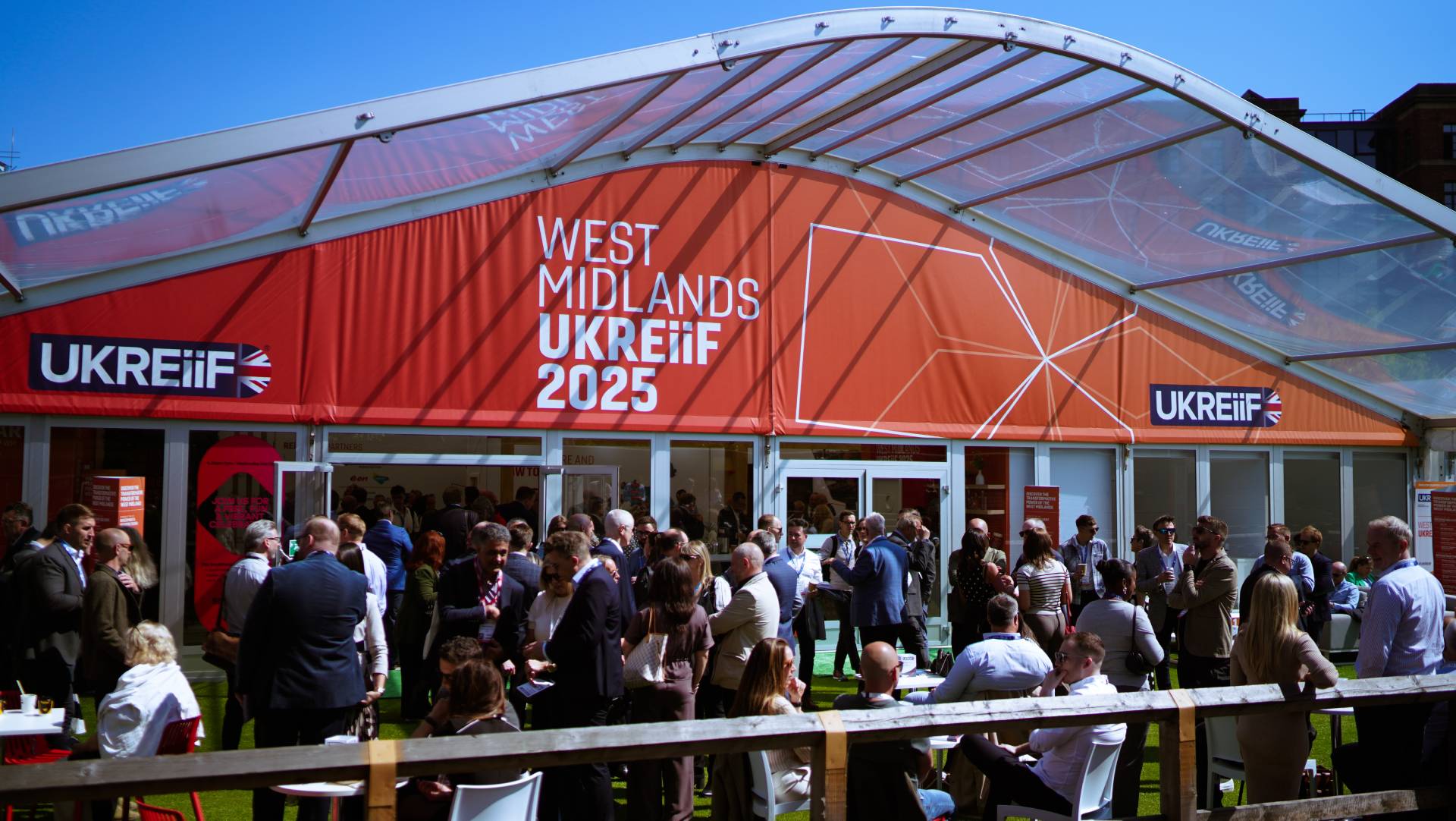
UKREiiF 2025 served as a powerful declaration from the West Midlands, showcasing the region’s commitment to driving transformative change. Over three dynamic days in Leeds, the West Midlands Pavilion commanded attention, delivering a confident and unified message: the West Midlands isn’t just promising evolution, it’s actively delivering it. This event underscored the region’s bold intent and its pivotal role in shaping a new future.
The region took centre stage with the big orange Pavilion. From headline panels and packed-out sessions, to the debut of the new Investment Zone video, the launch of Site Selection WM, we showcased live and future market opportunities, regional leadership and an ambitious growth vision shaped by public-private collaboration. Furthermore, our real estate experts held over 40 private meetings per day with those eager to capitalise on the outstanding offering of our cities and boroughs.
A united vision for growth
Richard Parker, Mayor of the West Midlands, opened with a speech that was both pragmatic and ambitious. Just over a year into his mayoralty and a year on from the general election announcement that coincided with UKREiiF 2024, his address acknowledged the uncertain political and economic conditions ahead but set out a bold, clear call to action.
He spoke of the need for long-term alignment across the public and private sectors and underlined the importance of putting people at the heart of growth. His invitation to investors was clear: back a bigger West Midlands story, one that builds on the region’s track record and puts inclusive, sustainable transformation at the centre of delivery.
His remarks set the tone for the panels and speeches across the week. A confident, united message ran throughout: the West Midlands is ready to deliver.
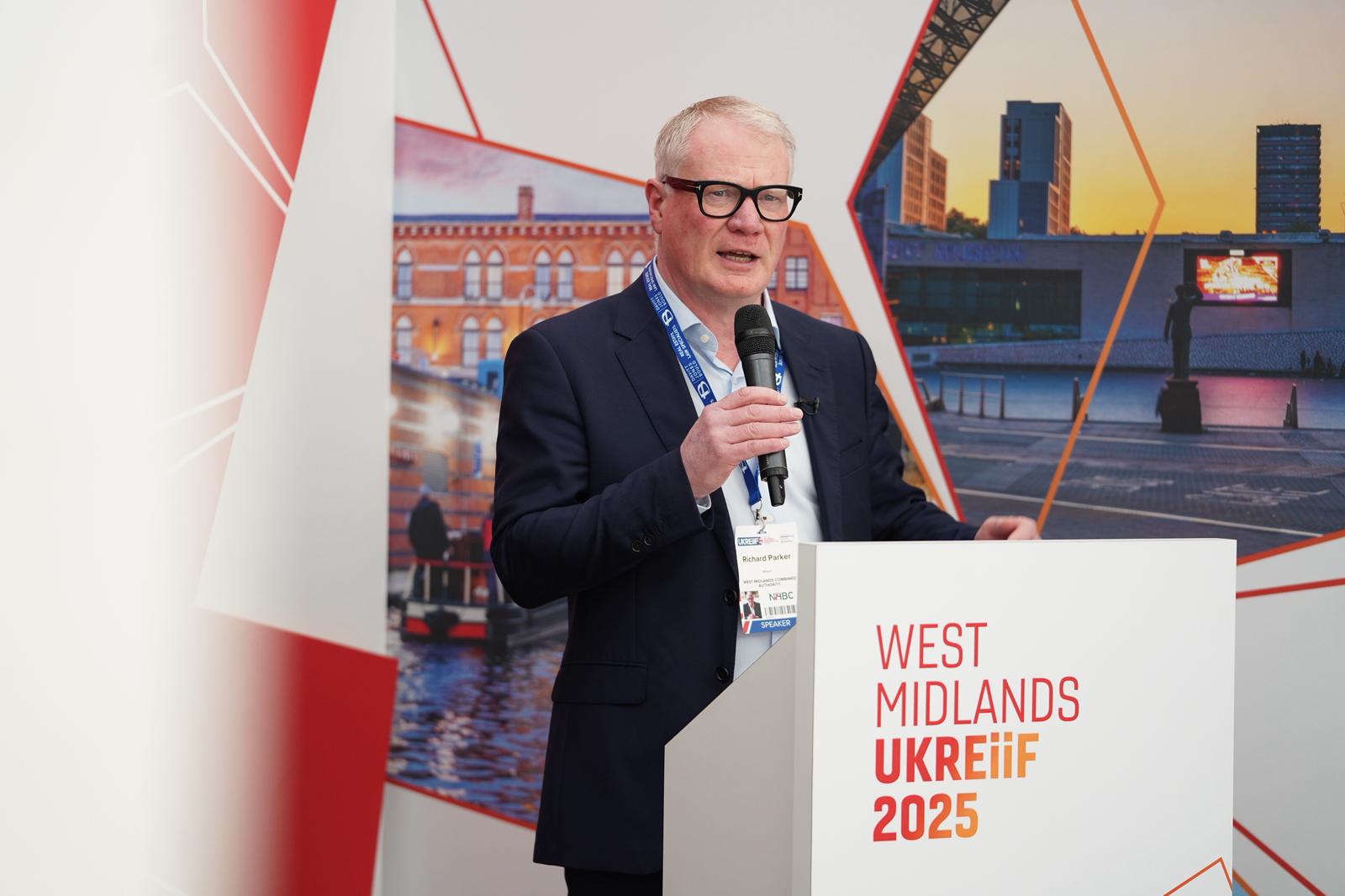
Site Selection WM launches
One of the week’s most significant announcements was the launch of Site Selection WM, our new digital platform designed to mobilise £19 billion worth of regeneration across the West Midlands. Introduced by Mayor Richard Parker, the platform showcases more than 60 major development and occupier sites using real-time data on planning, infrastructure, land use, demographics and connectivity, including proximity to HS2 and Metro links.
It marks a step-change in how the region presents its offer to national and international investors, providing a smarter, more transparent way to explore live opportunities across over 1,000 acres of development land.
You can explore the platform at siteselectionwm.com or read the full announcement here.
Housing Delivery — Tuesday 20th May, AM
Hosted by Lovell
The Housing Delivery theme opened with a keynote address from Rob Perrins, Chief Executive of Berkeley Group, who set the tone for a morning focused on ambition, resilience and partnership. Speaking candidly about the national challenges facing the sector; from policy uncertainty to inflation and interest rate pressures, he stressed that none of it should deter the industry from bold thinking. “We need to keep building, even when it’s difficult. Partnerships are the only way through this,” he said, urging local authorities and developers to align around shared outcomes.
The Housing Delivery: Making It Happen session brought this idea to life with real examples, showcasing Keon Homes’ Port Loop and Midland Heart’s Yardley Brook developments, as well as Walsall Council’s progress at Willenhall. The panel featured Richard Williams (Keon Homes), Stuart Penn (Lovell), Joe Reeves (Midland Heart), Emma Bennett (City of Wolverhampton Council), and Cllr Adrian Andrew (Walsall Council), who each shared insights on how collaboration, trust and local commitment are turning ambition into delivery. We also heard more on the Homes for the West Midlands LLP, launched by the Mayor in October, and now progressing its mission to accelerate the delivery of the region’s affordable housing ambitions. From modular housing to brownfield land delivery, the session shared practical insights on how housing projects are breaking ground despite constrained conditions. “It’s not just about funding, it’s about unlocking barriers together, planning, land assembly, and community buy-in,” noted Reeves.
The final session, Addressing Viability: The Future of Public Sector Intervention, shifted the focus to system-wide levers. Chaired by Shokat Lal (Sandwell Council), the discussion featured Richard Parker (Mayor of the West Midlands), Jo Nugent (Homes England) and Tim Johnson (City of Wolverhampton Council). The panel explored how the public sector can de-risk investment and maintain momentum in housing starts. Jo Nugent reiterated that Homes England remains committed to supporting sites that wouldn’t otherwise come forward, while Richard Parker spoke to the Combined Authority’s evolving approach post-election. “Housing delivery is still core to our inclusive growth mission, we’re focused on bringing partners with us to make it viable,” he said.
The key takeaway for investors and developers: despite national headwinds, the West Midlands is offering a coordinated, long-term plan to deliver homes at scale. With strong political backing, active intervention by Homes England, and credible local delivery partners, the region presents a stable and investable housing pipeline for those willing to back partnership-led models.
Infrastructure — Tuesday 20th May, PM
Hosted by Mott MacDonald
The Tuesday afternoon programme at the Pavilion spotlighted the vital role of infrastructure and energy in unlocking inclusive, sustainable growth. The sessions tackled the planning and delivery barriers facing major regeneration programmes, with a strong focus on place-based strategy, decarbonisation, and investor confidence.
E.ON, one of the West Midlands’s UKREiiF premier partners, brought energy transition to the forefront of the conversation. As a leading player in the region’s net-zero ambitions, E.ON’s priorities centre around decarbonising heat, accelerating the rollout of low-carbon technologies, and supporting place-based energy strategies that align with local growth. Their involvement throughout the week reinforced the importance of integrated infrastructure in making the West Midlands a national leader in clean growth.
The first panel, Challenging Barriers to Growth, chaired by Tim Fawcett from Mott MacDonald, explored how local authorities and developers can collaborate to deliver major schemes. Andy Williams (Coventry City Council), Cheryl Hiles (Energy Capital), Jo Russell (Stoford), and Natalie Robinson (E.ON) unpacked the structural, regulatory, and financial hurdles impacting development at pace and scale. Key messages included the need for clearer policy alignment between government departments and the role of infrastructure planning in reducing risk for investors. Coventry and E.ON’s strategic energy partnership – a UK first – was a key talking point, as well as Coventry’s major progress on Very Light Rail: two examples of how an ambitious Local Authority can send a strong, positive message to the market.
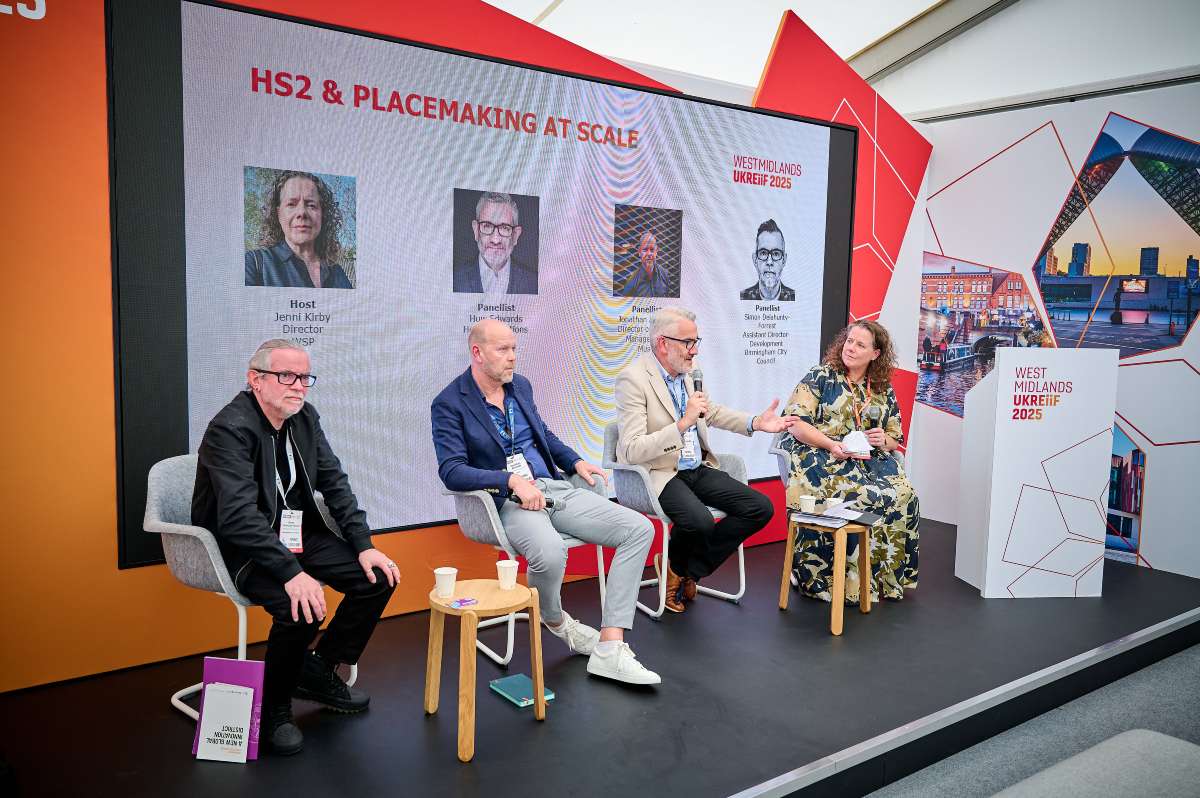
As conversations turned to transport infrastructure, a key session explored HS2’s role in enabling dynamic, mixed-use regeneration; including the £3.2bn Arden Cross development, highlighted by Jonathan Ashcroft (Muse). Hosted by Jenni Kirby (WSP), the panel included insights from Cllr Ian Courts (Solihull Council), Huw Edwards (HS2), and Simon Delahunty-Forrest (Birmingham City Council).
The discussion focused on HS2 as a once-in-a-generation catalyst for place-based transformation. Simon Delahunty-Forrest pointed to major changes already underway in Digbeth, with 10 sites and 6,000 homes driving momentum. “There’s more to Birmingham than bin bags,” he said. “We’re trying to make a destination you’ve never seen before.”
Jonathan Ashcroft emphasised early developer engagement and transparent collaboration: “Connectivity is not about cars, it’s about creating opportunity.” Edwards added, “We’re investing tremendous time, from social media to YouTube, to get the message across.”
While frustration remains about delivery timescales, the session made clear that HS2’s value lies in long-term opportunity. As Kirby concluded, “The scale is huge, the impact on local communities is massive.”
In her keynote, Transport Enabled Growth: The Vision for the West Midlands, Laura Shoaf outlined the strategic role transport-led development is playing in unlocking value across the region, not only around HS2 but in key locations where transport projects are now coming to fruition: the Dudley metro extension and the reopening of the Wolverhampton-Walsall train line are both due to complete in 2025.
The Pavilion audience heard a significant announcement as Shokat Lal (Sandwell Council) launched the procurement process for a strategic development partner to deliver West Bromwich’s £500 million regeneration masterplan. Framing the town not as a blank canvas but “full of opportunity,” he underlined the ambition to retain talent, grow the local economy and deliver real outcomes for residents.
The plan spans a transformational 22-hectare mixed-use site in the heart of the town centre, backed by £100 million of regeneration funding already secured. Lal emphasised the town’s strengths, strong infrastructure, community resilience and a clear economic vision and called for partners whose “vision, values and appetite” align with Sandwell’s.
Cllr Peter Hughes echoed this message, affirming that West Bromwich is open for investment and ready to work with developers to deliver long-term, inclusive growth.
A major talking point across the Pavilion was the surprise visit from Tom Wagner, co-owner of Birmingham City FC and managing partner at Knighthead Capital. His appearance underscored growing international confidence in the West Midlands and renewed interest in one of its most exciting regeneration opportunities: the Birmingham Sports Quarter.
Fresh details were revealed later that afternoon, confirming the scale and ambition of the project. The £500 million GDV masterplan was brought to life by Nick Smith and Jeremy Dale (Birmingham City FC and further details from Elise Baudon (Prior + Partners) and Hari Sothinathan (Deloitte) as key advisors on the project and Simon Delahunty-Forrest (Birmingham City Council). The session set out how public-private coordination is driving the scheme forward and positioning The Sports Quarter for long-term investment.
The Sports Quarter will transform the area around St. Andrew’s stadium, delivering a new 60,000-seat stadium, commercial and leisure spaces, high-quality public realm, and world-class event infrastructure. Now backed by newly confirmed government funding for the East Birmingham Metro extension, the scheme is a flagship opportunity for inclusive growth, inward investment and place-based transformation in East Birmingham.
The West Midlands is building at scale, planning with intent, and inviting developers and investors to partner on place-based regeneration grounded in real infrastructure delivery. With transport, energy, and placemaking aligned, the region made a strong case for long-term investment.
Investment & Occupier Trends – Wednesday 21st May, AM
Hosted by Shoosmiths
The Investment & Occupier Trends sessions opened with Shoosmiths partners Beth McArdle and Kate McCall welcoming attendees and framing the conversation around planning certainty, legal frameworks, and the evolving investor landscape. They set a clear tone: the West Midlands is positioning itself to meet demand with investable places and clear delivery strategies.
The morning’s first panel, Resetting the Dial: Birmingham, chaired by James Watts (Arup), examined how the city is reasserting its role on the national investment stage. Joanne Roney CBE (Birmingham City Council) spoke about the need for long-term civic leadership and the impact of narrative clarity on investor confidence. Harry Badham (Hammerson) reinforced the importance of public-private collaboration, highlighting how commercial assets are being reimagined to meet shifting post-pandemic occupier needs. He pointed to the Bullring’s success in attracting major brands like M&S and Sephora as proof of Birmingham’s retail resilience. The session also spotlighted Birmingham’s rise as the UK’s leading Build-to-Rent (BTR) market outside London, with over £1.5 billion of BTR investment secured in recent years. The city’s residential pipeline now stands at over 33,000 units. Combined with over £1 billion of commercial and mixed-use schemes underway and record levels of inward investment in 2023. The message was clear: Birmingham is booming.
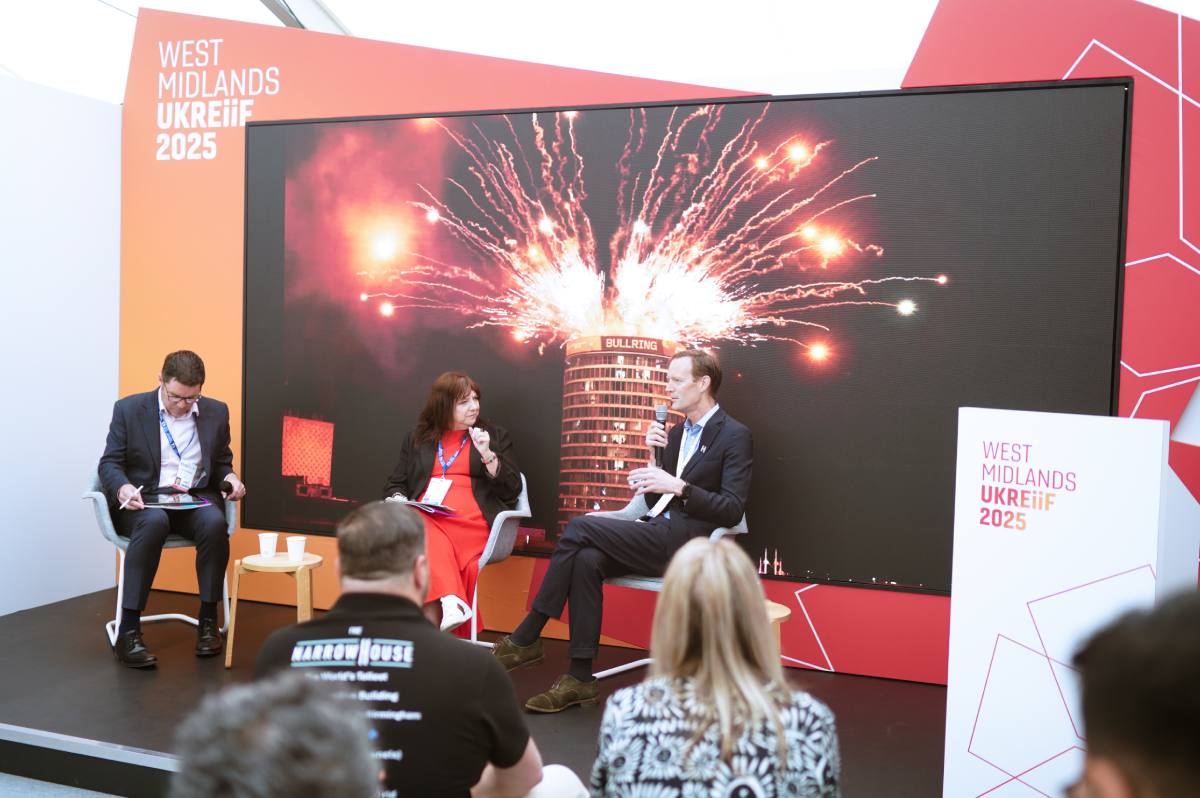
A keynote from Nick Walkley (Avison Young) offered a wider lens. Drawing on his experience advising both UK and global investors, Walkley spoke about the West Midlands’ resilience and the role of place-based regeneration in attracting sustained capital flows. While candid about national headwinds, he noted that regions with strong leadership and clear growth plans; like the West Midlands, are increasingly attractive.
The challenges of delivering new employment land was a key talking point at UKREiiF, and this panel brought together those responsible for planning it. Chaired by Ian Griffin (Insider Media), the session featured Tim Johnson (City of Wolverhampton Council), Michael Kirkland (Logistics Capital Partners), Sarah Fordham (Indurent), and Professor Prashant Pillai (University of Wolverhampton). Together, they explored what’s needed to meet the growing demand for logistics-ready sites and innovation-led space across the West Midlands.
The panel stressed the urgency of unlocking land with the right infrastructure in place. Occupiers need speed, certainty, and access to utilities and the region must act quickly to compete globally. Industry-academia collaboration was also highlighted as a core part of talent planning and site readiness.
The conversation also introduced The Central Edge, a newly launched economic growth zone, which covers Wolverhampton and South Staffordshire. Backed by political alignment and strategic planning, this 1,000-acre programme is set to become a major cluster for logistics, engineering and advanced manufacturing, putting employment land at the heart of the West Midlands growth story.
Throughout the morning, the overarching takeaway was clear: the West Midlands is not waiting for the market to improve, it is creating the conditions for investment to happen now. A coordinated planning approach, emerging joint venture models, and strategic deployment of Investment Zone levers are making the region a more predictable and profitable environment for developers and occupiers alike.
Pitch Up! – Wednesday 21st May, Lunchtime
The West Midlands’ signature showcase session returned with a rapid-fire format and powerful investment messaging. Pitch Up! gave the region’s most investable projects a platform to shine, each backed by clear economic data, partner alignment and delivery progress.
This year’s spotlight included:
“The potential of the Gigapark can’t be overstated. With its scale, incentives and location, it’s a generational opportunity for green manufacturing.”
Coventry & Warwickshire Gigapark
Cllr Jim O’Boyle (Coventry City Council) presented the transformational Gigapark, one of the UK’s leading Investment Zone sites. He described its role in anchoring the country’s battery and automotive ecosystem, supported by world-class R&D, university research and targeted tax incentives. O’Boyle praised the promotional film as “the best of the week,” reflecting strong interest from attendees.
“Smithfield will redefine what city centre living and working looks like. This i a project built for people and built to last.”
Smithfield Birmingham
As one of the region’s flagship sites, Smithfield Birmingham took centre stage. Selina Mason (Lendlease) showcased the scale, ambition and centrality of the development, which is backed by Lendlease as master developer and supported by Birmingham City Council.
Spanning over 17 hectares in the city centre, Smithfield will deliver a new market, thousands of homes, cultural assets, and workspace, a major new quarter for the region. The session complemented the premiere of the Smithfield film earlier in the week and the headline evening takeover.
Birmingham Knowledge Quarter
Joanna Birch (Woodbourne Group) pitched the Knowledge Quarter as a global innovation destination and Investment Zone asset. She spoke about the potential for cross-border collaboration, particularly in MedTech, digital health and AI, emphasising the role of Bruntwood SciTech and Aston University in anchoring growth.
Wolverhampton’s Green Innovation Corridor
Paul Woodcock (City of Wolverhampton Council) highlighted one of the UK’s fastest-growing CleanTech clusters. The corridor brings together the Springfield Campus, industry partnerships and major net-zero initiatives to create a future-facing industrial offer. The message to investors was clear: collaboration, land, and skills are in place and delivery is happening now.
Innovation – Wednesday 21st May, PM
Hosted by Arcadis
The afternoon programme on Wednesday showcased the West Midlands as a globally recognised hub for innovation, research excellence and cutting-edge industrial clusters. The sessions reinforced the region’s distinct advantage in creating investable places rooted in university partnerships, R&D infrastructure and specialist skills.
It Starts Here, a session that brought innovation down to earth by focusing on what makes the West Midlands a fertile ground for new ideas and enterprise. Hosted by Simon Marks (Arcadis), the conversation featured Jane Coleman (University of Warwick) and Harpal Mattu (Agilyx Group), who shared powerful reflections on the region’s academic strengths, accessibility, and collaborative energy.
Jane Coleman highlighted how world-class research and innovation must be made visible and tangible: “We need to play to our strengths and be proud of what we’re delivering.” She called HS2 a “game changer” for regional opportunity, stressing how connectivity reinforces the West Midlands’ advantage in attracting talent and investment.
Harpal Mattu echoed the sentiment, sharing why his business relocated from Reading to Birmingham: “You don’t need to travel anymore to get what you need.” He praised the region’s diverse workforce, university links and cost competitiveness, arguing that the ingredients for global success are already here.
Together, the session underscored the region’s ambition to lead not only in innovation; but in inclusive innovation, built on academic excellence, affordability, and genuine partnership.
Next, Birmingham Knowledge Quarter: Global Innovation at the Heart of the UK’s Second City, opened with remarks from Cllr Sharon Thompson of Birmingham City Council. She framed the Knowledge Quarter as one of the most exciting university-anchored development zones in the UK, offering scale, talent and strategic growth potential.
Chaired by Catherine Hadfield, Strategic Lead for Birmingham Knowledge Quarter, the panel brought together Rob Valentine (Bruntwood), Andrew Dakers (West London Business), Joanna Birch (Woodbourne Group) and Luke Southan (Aston University). Each speaker demonstrated how quadruple-helix collaboration, between academia, government, business and communities is already delivering on the ground.
The discussion highlighted how the Knowledge Quarter is fast becoming a globally significant MedTech and health innovation cluster, with the region home to the largest number of clinical trials outside Oxford and the largest medical device cluster in the UK. It also explored the cross-sector innovation ecosystem developing across Birmingham, supported by leading research institutions and digital infrastructure.
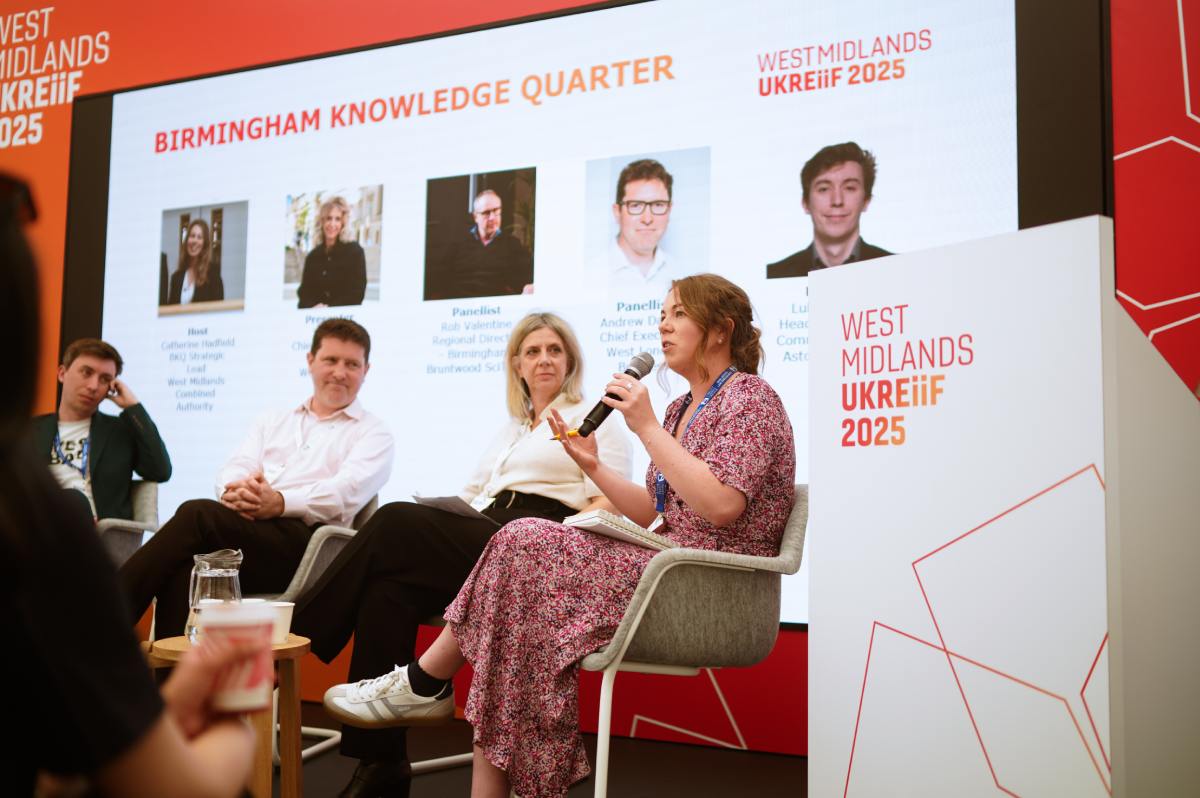
The second session, Maximising Clusters: Innovation Driving Investment in Coventry & Warwickshire, was introduced by The Rt Hon Greg Clark, Chair of the University of Warwick’s Innovation District, and hosted by Neil Rami from West Midlands Growth Company.
This panel showcased how Coventry & Warwickshire is combining its R&D assets, future mobility infrastructure and creative industries to form one of the UK’s most dynamic investment destinations.
Speakers included Mark Tock (University of Warwick Science Park), Peter Vale (Severn Trent), Julie Nugent (Coventry City Council), Isobel Woods (Warwickshire County Council), and Ian Harrabin (Complex Development Projects). Together, they mapped out the region’s innovation proposition – one grounded in long-term skills pipelines, university collaboration and large-scale infrastructure like the upcoming Greenpower Park.
Greenpower Park, a £400m battery and energy technology campus, is a flagship project within the West Midlands Investment Zone. It represents a new type of clean growth development – one that brings together research and manufacturing with place-based economic inclusion. Speakers emphasised that the park is not only a significant R&D asset but also a tool for driving high-quality jobs and levelling up within local communities.
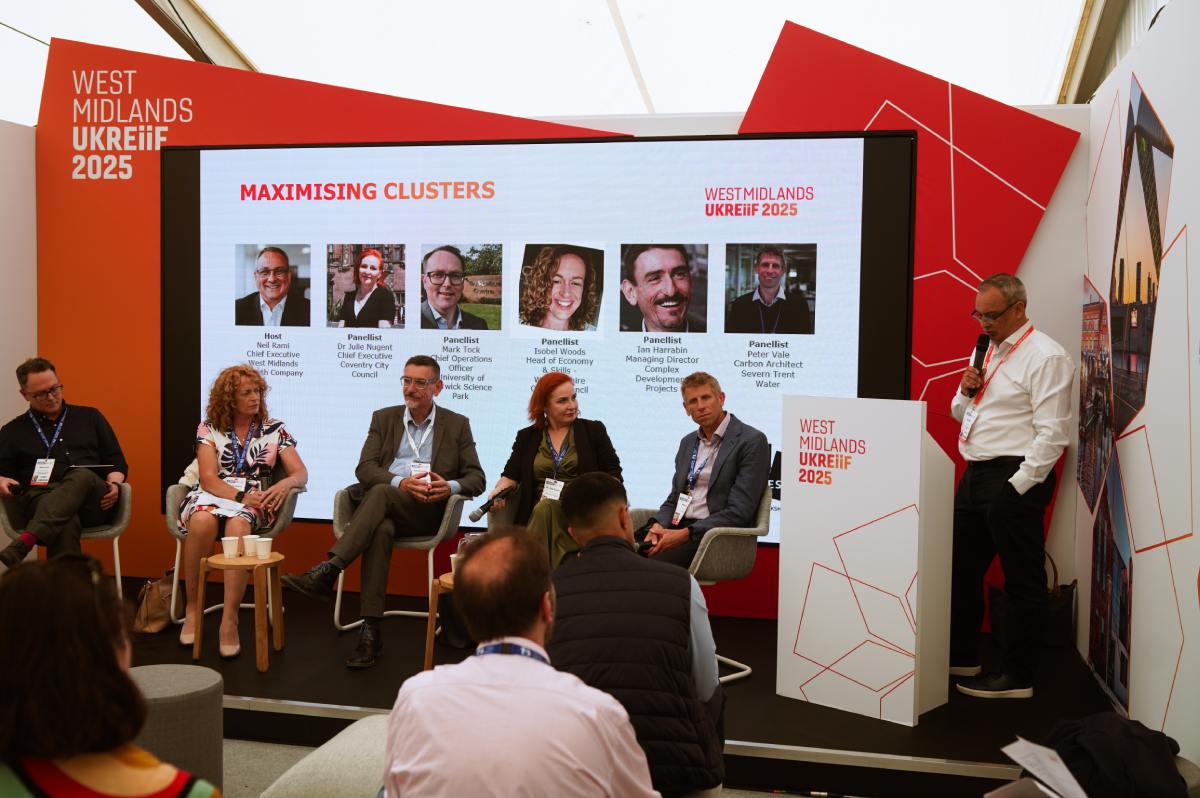
From the Knowledge Quarter in Birmingham to innovation districts across Coventry and Warwickshire, the session underlined a single, powerful message: the West Midlands is not just open to innovation-led investment, it is setting the pace.
The West Midlands is leveraging its internationally significant innovation clusters, university infrastructure and place-based leadership to attract investment and scale new technologies. For investors and developers, this means access to fast-growing markets, deep talent pools and the UK’s most connected research ecosystems.
Smithfield Birmingham Takeover — Wednesday 21st May, Evening
On Wednesday evening, the West Midlands delivered a standout event in the heart of Leeds, transforming the venue into a celebration of Birmingham’s boldest regeneration opportunity, Smithfield Birmingham.
Selina Mason (Lendlease) opened the evening with an introduction to the vision behind the development, setting the stage for an unforgettable night.
Guests were treated to a powerful spoken word performance by Casey Bailey, award-winning writer and former Birmingham Poet Laureate. His piece, Beyond a Vision, brought the city’s energy, ambition and warmth to life:
This is a celebration meets renovation – reimagination of this place…
Where the Brummy Twang still fills the air in this most amazing space.
Be proud, be in awe, be amazed by where you are.
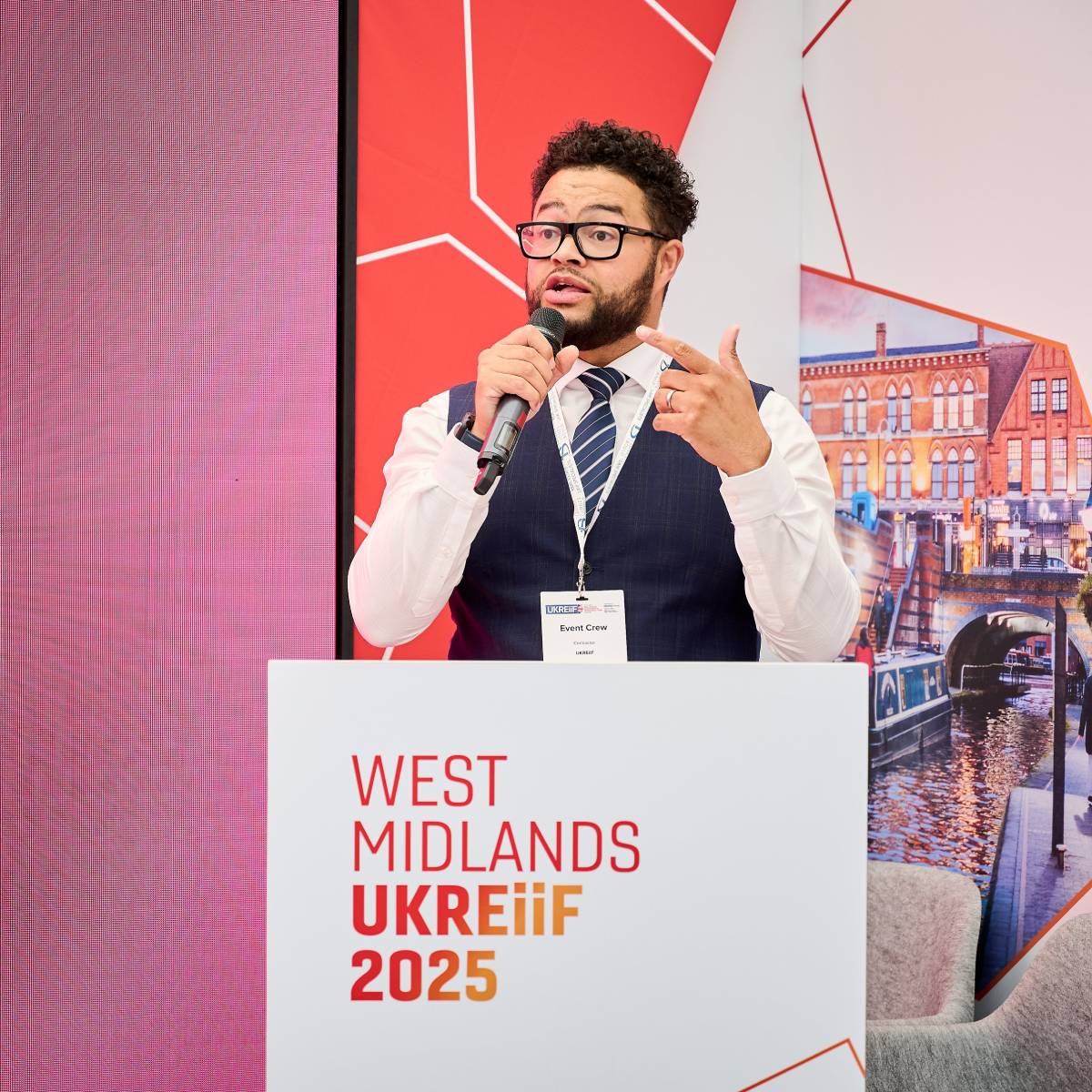
It was a moment that captured the emotional power of placemaking and the importance of identity in shaping the future.
The evening continued with cocktails, a DJ, and a packed crowd of partners, investors and friends of the region. The atmosphere was vibrant and celebratory, reinforcing the momentum and excitement behind Smithfield Birmingham and the opportunities it represents.

Policy – Thursday 22nd May, AM
Hosted by Metro Dynamics
The final morning of UKREiiF 2025 focused on policy, leadership and delivery, closing the West Midlands Pavilion programme with a forward-looking discussion on the systems and partnerships needed to deliver long-term, inclusive growth.
The session opened with a keynote from Ed Cox (West Midlands Combined Authority), who introduced the West Midlands Futures Green Paper. He framed it as a live framework rather than a static document, one designed to unite public, private and community stakeholders around a shared agenda for the next decade.
This is not about writing another strategy. It’s about shaping a region that’s equipped for the future, from net-zero infrastructure to inclusive housing and the skills we need to get there.
Chaired by Fiona Tuck (Metro Dynamics), the panel unpacked how delivery is defined in practice. Julia Goldsworthy (Legal & General) stressed the importance of investor confidence, calling for stable frameworks that align private capital with place-based outcomes. “Clarity of purpose is essential,” she said. “Investors want to know the goalposts won’t keep shifting and in the West Midlands, that alignment is increasingly evident.”
Dan Meredith (E.ON) offered insight from the energy sector, underlining that net zero must be built in from the outset, not retrofitted. He challenged developers and local authorities to treat energy as critical infrastructure: “You cannot plan 21st-century regeneration without energy at the core.”
Rob Valentine (Bruntwood SciTech) brought a commercial real estate perspective, focusing on what makes the West Midlands attractive to innovation-led occupiers. He spoke of the region’s emerging ecosystem of universities, science hubs and collaborative councils. “We invest where there’s vision, but more importantly, where there’s delivery.”
Taken together, the session conveyed a consistent message: the West Midlands is becoming easier; not harder, to invest in. For developers and institutional investors, policy in the region is being actively reshaped to support delivery, unlock scale and build the kind of public-private alignment that underpins long-term value.
The West Midlands at UKREiiF 2025 was sponsored by Premier partners: E.ON and Lendlease. Partners: Lovell, Mott MacDonald, Muse, Shoosmiths, Stoford. Supporters: Agilyx Group, Apsley House Capital PLC, Arup, BDP, Cundall, Constructing West Midlands, Deloitte, Hammerson, Keon Homes, Pinnegar Hayward Design, Prior + Partners, Stonebond, Woodbourne Group, WSP.
Final reflections from Andrew Dunbar, Head of Capital Attraction, West Midlands Growth Company
UKREiiF 2025 was our most ambitious year yet and the response was phenomenal. We saw more attendees through the doors of the West Midlands Pavilion than ever before, with genuine appetite to understand what’s happening across our cities and boroughs.
Across the week, our sessions got right to the heart of what matters to investors: delivery, ambition, and confidence. We showcased £19bn of real opportunities through Site Selection WM and brought forward the projects and partnerships that prove the region is ready for investment.
We know not everyone could make it to every session or catch us in Leeds, so if you’re interested in what the West Midlands has to offer, get in touch. There’s more to come, and we’d love to tell you the full story.
